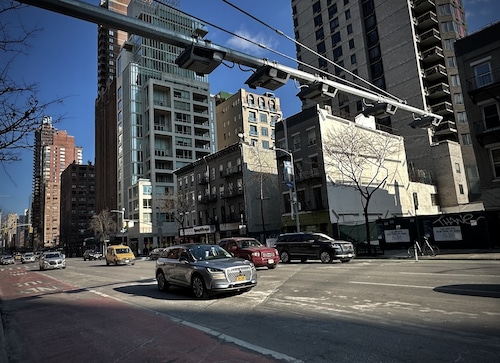
Cars enter the Congestion Relief Zone (CRZ) passing under the overhead license plate readers at 60th Street and 2nd Avenue in Manhattan’s Upper East Side, on Sunday, Jan. 12, 2025. (Staten Island Advance/Steve Zaffarano)Steve Zaffarano
U.S. Transportation Secretary Sean Duffy made good on President Donald Trump’s promise to end New York City’s congestion pricing toll, pulling its federal approvals Wednesday.
Duffy called the program that charges a $9 fee to enter Lower Manhattan a “slap in the face to working class Americans and business people.”
Duffy rescinded the November 2024 agreement that allowed it to start on Jan. 5. He wrote to New York Gov. Kathy Hochul this morning.
“Commuters using the highway system to enter New York City have already financed the construction and improvement of these highways through the payment of gas taxes and other taxes,” Duffy said in a statement. “But now the toll program leaves drivers without any free highway alternative, and instead, takes more money from working people to pay for a transit system and not highways. It’s backwards and unfair.”
Congestion pricing was intended to raise $1 billion in annual revenue for MTA capital programs, reduce gridlock, air pollution and crashes. It was the first program of its kind in the United States.
But Jersey drivers won’t see an immediate break.
The cameras are not going dark until a federal judge has ruled on a lawsuit filed by the MTA in federal court Wednesday that challenged Duffy’s action.
New York Gov. Kathy Hochul defiantly declared “the cameras are staying on” at a Wednesday press conference with MTA CEO Janno Lieber.
“We responded with a lawsuit that said, we’re seeking a declaratory judgement that this is not proper and we are not turning off the tolls ... until a judge rules,” Lieber said.
In the letter, Duffy referred to concerns raised by New Jersey Gov. Phil Murphy and state Transportation Commissioner Francis O’Connor in separate January letters expressing concern on the effects of the tolls on state commuters residents and communities.
Without mentioning Murphy by name Hochul slapped back at New Jersey’s opposition, saying the USDOT “actually cited the will of New Jersey ... New Jersey didn’t want this.”
“Ignoring the will of the people who live here, their elected leaders in Albany, and all of a sudden, the Trump Administration is citing, “New Jersey isn’t happy,” she said.
“In what world should we stand down because of another state?” she said. “I’d like to have all New York teams playing in New York. I’m not asking the federal government to annex the Meadowlands.”
The program was challenged in court by New Jersey, most recently in an appeal that attacked the very approval Duffy rescinded. New Jersey attorneys argued the Federal Highway administration rubber stamped a new toll rate proposed by Hochul in November without doing a proper assessment.
Congestion pricing was challenged in court by New Jersey, most recently in an appeal that attacked the very approval Duffy rescinded. New Jersey attorneys argued the Federal Highway administration rubber stamped a new toll rate proposed by Hochul in November without doing a proper assessment.
Duffy used a different rationale.
“Except for limited exceptions allowed by Congress, highways constructed with federal-aid highway funds cannot be tolled,” he said.
The construction of federal-aid highways as a toll-free highway system has long been fundamental to the federal-aid highway program, he said.
“While I have consistently expressed openness to a form of congestion pricing that meaningfully protects the environment and does not unfairly burden hardworking New Jersey commuters, the current program lines the MTA’s pockets at the expense of New Jerseyans,” Murphy said in a statement. “Although we have had a difference of opinion with our colleagues in New York on congestion pricing, we have always had a productive relationship with our neighbors across the Hudson. I look forward to continuing that spirit of partnership for the benefit of the entire Tri-State Area.”
MTA CEO Lieber said the transit agency has no contingency plan, and cited other court victories against New Jersey and in New York.
“This will stand up in court,” he said. “It’s mystifying that after four years and 4,000 pages of federally-supervised environmental review, and barely three months after giving final approval to the Congestion Relief Program, USDOT would seek to totally reverse course.”
New Jersey’s business community reacted positively to the end of congestion pricing.
“From the first day this misguided policy was floated, it smacked of something that was bad for New Jersey commuters and visitors into New York and a money grab for the city,” said Michele Siekerka, CEO of the New Jersey Business and Industry Association.
“Unfair policies that serve as only a detriment to New Jersey drivers with no positive upside should have no place in any regional transportation policy and we’re happy with USDOT’s action today,” she added.
“From Day One, when we first started this fight, we knew that the Congestion Tax was just a giant cash grab for New York and the MTA — all on the backs of hardworking Jersey families,” said U.S. Rep. Josh Gottheimer, D-5th Dist. “They never cared about how the tax would hurt Jersey families — they just needed the cash to pay for the MTA’s woeful mismanagement. That was just confirmed today — and now, we can all breathe a sigh of relief.
“As I always say, don’t mess with Jersey. Screw with us, and you’ll find out why.”
Republican legislators also hailed the decision with State Senate Minority Leader Tony Bucco, R-Morris, calling it a “win for Nre Jersey commuters.”
New York commuter groups condemned the decision.
“Six weeks in, there’s no question that congestion pricing is working,” said Lisa Daglian, executive director of the Permanent Citizens Advisory Committee to the MTA.
“Drivers from around the region are seeing less traffic; bus riders are seeing substantially faster trips; and riders are benefitting from much-needed investment in our essential transit infrastructure,” she said in a statement. “Recent polling found that more than 60% of CBD drivers approve of the program.“

Stories by Larry Higgs
Our journalism needs your support. Please subscribe today to NJ.com.
Larry Higgs may be reached at lhiggs@njadvancemedia.com. Follow him on X @CommutingLarry
